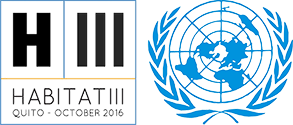Approximately 110 stakeholder groups exchanged views with UN Member States and observers on the zero draft of the outcome document for the UN Conference on Housing and Sustainable Urban Development (Habitat III), which was released in May 2016.
Participants at the Habitat III Informal Hearings with Stakeholders held panel discussions on: key recommendations by the Co-Chairs of the General Assembly of Partners for Habitat III (GAP); the Quito Declaration, the expected political outcome of Habitat III; transformative commitments for sustainable urban development; effective implementation; implementation at the local level; follow-up and review; and partnerships for the New Urban Agenda.
 9 June 2016: Approximately 110 stakeholder groups exchanged views with UN Member States and observers on the zero draft of the outcome document for the UN Conference on Housing and Sustainable Urban Development (Habitat III), which was released in May 2016. Participants at the Habitat III Informal Hearings with Stakeholders held panel discussions on: key recommendations by the Co-Chairs of the General Assembly of Partners for Habitat III (GAP); the Quito Declaration, the expected political outcome of Habitat III; transformative commitments for sustainable urban development; effective implementation; implementation at the local level; follow-up and review; and partnerships for the New Urban Agenda.
9 June 2016: Approximately 110 stakeholder groups exchanged views with UN Member States and observers on the zero draft of the outcome document for the UN Conference on Housing and Sustainable Urban Development (Habitat III), which was released in May 2016. Participants at the Habitat III Informal Hearings with Stakeholders held panel discussions on: key recommendations by the Co-Chairs of the General Assembly of Partners for Habitat III (GAP); the Quito Declaration, the expected political outcome of Habitat III; transformative commitments for sustainable urban development; effective implementation; implementation at the local level; follow-up and review; and partnerships for the New Urban Agenda.
Habitat III convenes in Quito, Ecuador, in October 2016, and is expected to agree on the New Urban Agenda as its outcome document.
During the meeting, which took place from 6-7 June 2016, at UN Headquarters in New York, US, Habitat III Secretary General Joan Clos lauded the participatory process and inclusion and integration of stakeholders in presenting their views and contributing their expertise. He said stakeholders are the main partners on the ground, and will play a critical role in implementing the New Urban Agenda once adopted.
GAP President Eugenie Birch presented the GAP, highlighting its proposal to create an open multi-stakeholder, post-Habitat III coordination mechanism, focusing on knowledge, advocacy, innovation, monitoring and investment. Shipra Narang Suri, GAP, added that the proposed partnership would be: rights-based and people-centered; rooted in decent work and social inclusion; gender responsive; planet sensitive; just and participatory; and evidence-based. Regarding commitments to be taken at Habitat III, she highlighted: women’s rights and gender; the role of stakeholders in the follow-up and review process; and recognition of the “new urban reality,” including increased urban humanitarian and environmental crises. She also called for: long-term predictable financing; housing and land planning; and matrices on and partnerships for data collection.
The Quito Declaration panel addressed: the role of philanthropic organizations; integrated approaches to sustainable urban development; and conceptualization of the range of human experiences to enable the full participation of persons with disabilities. The panel on transformative commitments for sustainable urban development discussed: placing women at the center of the New Urban Agenda; addressing the impacts of urbanization in rural areas; instituting enabling conditions for finance; and recognizing the linkages between informal employment and informal settlements.
The panel on the effective implementation addressed: renewing political commitments and partnerships; implementing the New Urban Agenda; ensuring human, cultural and environmental rights are fulfilled; and ensuring polity coherence with other international processes. The panel on implementation at the local level discussed: decentralization and local taxation; participation in strategic planning, policy conception and follow-up; reinforcing local institutions; securing funding for public transport; and ecological taxation.
The follow-up and review panel considered: gender-equal science; youth in the follow-up and review process; linkages between the New Urban Agenda and the High-Level Political Forum on Sustainable Development (HLPF); the role of indigenous peoples in implementation; and social and environmental indices and regional networks for data collection. The panel on partnerships for the New Urban Agenda highlighted experiences from different countries, including: partnerships between governments and universities; a recycling network; community-driven data collection; and youth-to-youth partnerships.
Intergovernmental negotiations on the Habitat III outcome document began in April 2016 and will continue with sessions taking place in New York, US, from 8-10 June, and 29 June to 1 July 2016. The Preparatory Committee will hold its third of three meetings in Surabaya, Indonesia, in July. [Informal Hearings Website] [IISD RS Coverage of the Informal Hearings] [Habitat III Website] [Zero Draft of the New Urban Agenda] [Publication: GAP Outcome Document: Partnership for a New Urban Agenda]